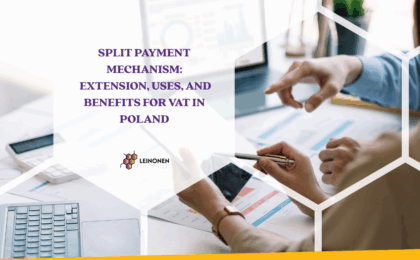We would like to inform you about upcoming important changes in VAT in Poland.
1. From 01/09/2019 an obligatory mechanism of split payment is planned for transactions over PLN 15,000 documented with an invoice and listed in Annex No. 15 to the VAT Act, such as: metal products, scrap, precious metals, computers, laptops and processors, cell phones, car parts, recyclable materials, foils, fuel for cars, construction services.
The seller of the goods and services included in Annex 15- must put on the invoice the mandatory information: “Mechanizm podzielonej płatności ” (split payment mechanism). Otherwise it is exposed to a penalty of 100% VAT.
The buyer must pay in the “split payment” mode, otherwise he is also exposed to a 100 VAT tax sanction.
Due to the introduction of the above changes, the obligation to issue invoices in the “reverse charge” mode for transactions in Annex 15 will disappear.
2. From 1/9/2019 a so-called “white book of taxpayers” will be created on the website of the Ministry of Finance. This is a list of VAT taxpayers containing: contact details, all information about registration or deregistration from the VAT data base, taxpayer status at any time, and the bank account numbers.
The invoices above PLN 15,000 must be paid to the bank account listed in the “ the white book of taxpayers”. This means you need to verify this bank account number each time you make a payment.
From 1.01.2020, invoice payment for an unpublished bank account will result in sanctions:
- joint and several liability for counterparty VAT liability
- such invoice will not be tax deductible for CIT.
We will avoid the above sanctions if:
- we will notify the tax office within 3 days from payment
- we will pay in split payment
3. The liquidation of monthly VAT returns is planned for large entities from 01.01.2020, and from 01.07.2020 for small entities. The VAT return will be replaced with a JPK file (SAF-T) with extended data – JPK VDEK.
4. It is planned to introduce the possibility to use money accumulated on VAT bank account for other tax liabilities: PIT, CIT and ZUS.
5. From 01/07/2019 a penalty of PLN 500 has been introduced for each error found in the JPK(SAF-T) file. The sanction will be imposed if the taxpayer fails to correct the error within 14 days from being informed by the tax office.
6. On-line cash registers allowing for sending data directly to the Central Repository of the Cash Register. The need to use a new type of online cash registers for industries:
- From 01.01.2020 – fuel company/industry , car workshop
- From 01.07.2020- gastronomy and hotels, coal and solid fuels
- From 01.01.2021-construction industry, legal services, hairdressers, medical services, cosmetics, fitness centers.
The employee operating the cash register must be trained in its service and sign a statement on reading the information on the rules of registration.
7. Change regarding the documentation of WDT transactions – intra-Community supply of goods in the European Union. From January 1, 2020, unified rules will apply throughout the EU (Article 45a of the EU Council Implementing Regulation 2018/1912 from 4.12.2018).
To use 0 % VAT rate ,you will need to have at least 2 documents confirming the export of goods issued by 2 different parties, independent of each other, from the seller and from the buyer.
If the seller orders transport- then it can be:
- CMR, and
- one of the following documents: confirmation of payment for transport, insurance policy, notarial, official documents, confirmation of receipt from the buyer’s warehouse
If the buyer himself takes the goods, the seller must have:
- up to the 10th day of the next month – a written declaration of the buyer about the shipment of the goods including: date of issue, name / surname, address of the buyer, quantity and type of goods, date and place of arrival of the goods, surname, persons accepting the goods
- CMR, and
- one of the following documents: confirmation of payment for transport, insurance policy, notarial, official documents, confirmation of receipt from the buyer’s warehouse.
8. Call Off Stock-consignment warehouse, unification of regulations in the EU.
the rules are set out in Article 55a of the Implementing Regulation of the EU Council 2018/1912 of 4.12.2018. Changes from 01.01.2020 :
- keeping records of goods by the taxpayer who sends, as well as by the taxpayer who collects goods from the consignment warehouse.
- a time limit of 12 months for storing goods in call off stock
- the possibility of storing commercial goods is allowed, not only production goods and products intended for service activities.
9. From 01.01.2020 a ban on issuing the invoice to the cash register bills (paragons) has been introduced, unless the tax identification number of the buyer is given on the receipt.




